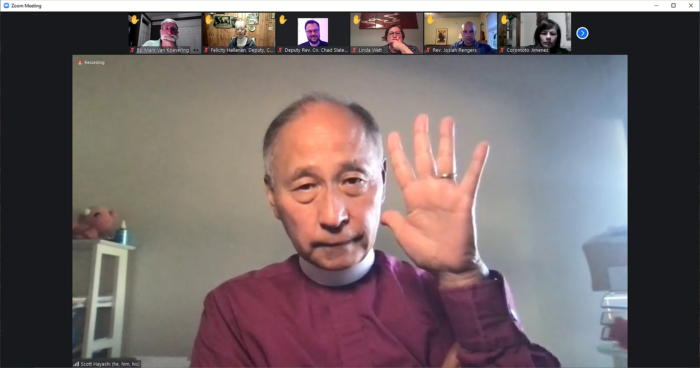World Mission committees hear call to acknowledge and grieve colonialismPosted May 18, 2022 |
|

Bishop Scott Hayashi of Utah asks for a show of hands while chairing the May 16 online meeting of the General Convention legislative committees on World Mission. Screenshot: Melodie Woerman
[Episcopal News Service] General Convention’s legislative committees on World Mission heard testimony May 16 on Resolution A017, which calls The Episcopal Church to “acknowledge and grieve” its past practices of colonialism in mission efforts around the world.
The church’s efforts toward racial reconciliation helped inspire the resolution, said Martha Gardner, a Massachusetts deputy and chair of the Standing Commission on World Mission, which proposed A017 in its 2020 Blue Book report. “We felt that in addition to doing the work in terms of the United States, we also need to look historically at our work in terms of global mission,” she testified. Noting the work of the Presiding Officers’ Working Group on Truth-Telling, Reckoning, and Healing, she added the resolution addresses what she called “a unique lane” in the church’s approach to global mission – to explore historical complicity and to examine how dioceses and congregations now undertake mission work outside the United States.
“Is it still with this kind of colonial imperialism, racist attitude?” she asked.
After a one-year postponement and now a reduction in size, duration and scope, the 80th General Convention is now scheduled to take place over four days in Baltimore, Maryland, July 8-11. In the lead-up to convention, two-dozen bishops’ and deputies’ committees are holding hearings together online.
The Rev. Judy Quick, an alternate deputy from Alabama and a standing commission member, said this resolution helps highlight “the power dynamics which have been historically present and in many cases may still be present in our global mission.” She also stressed what she called a “theology of companionship,” included in the guiding principles of a digital mission toolkit developed by the Standing Commission on World Mission, the church’s Office of Global Partnerships and the Global Episcopal Mission Network. These principles, Quick said, stress “the importance of mutuality and acknowledgement and that everybody has God-given gifts to share, and that we can learn from each other.”
The Rev. Grey Maggiano, rector of Memorial Episcopal Church in Baltimore, Maryland, said that his parish has done a lot of work around the issue of reparations, and it’s time to take a similar look at the church’s imperialist role around the world. “How we talk about mission in the church leaves a lot to be desired,” Maggiano said. He said both the Anglican Communion and The Episcopal Church have perpetuated evils in the name of Jesus, either done by the church or in the church’s name. “This resolution really serves to guide the work of the Standing Commission on World Mission on cataloging some of these evils and processing our history of colonialism, so that we as a church can be better focused going forward,” he said.
Gardner pointed out the collaboration taking place in the Triangle of Hope as a model of a change in mindset. The Episcopal Diocese of Virginia, the Church of England’s Diocese of Liverpool and the Anglican Diocese of Kumasi in Ghana form the triangle and are working together in a “covenantal community dedicated to transforming the long history, ongoing effects, and continuing presence of slavery in our world through repentance, reconciliation, and mission.”
Committee member Bishop Prince Singh, bishop provisional of the Dioceses of Eastern and Western Michigan, asked how the success of this anti-colonialism work will be measured. Maggiano said that before anything else can happen, “We’ve got to know exactly how bad it is.” Gardner said one measure would be if those engaged in mission are thinking and acting differently than they did before. “Are they going into these relationships looking at not doing projects for but with?” she asked.
The committees also added funding to the resolution, proposing that $50,000 be budgeted for the Office of Global Partnerships to oversee this work. In total, three people spoke in support of A017.
The committees also heard testimony on Resolution A028, also proposed by the standing commission, which offers support for the work of the Global Episcopal Mission Network and celebrates its 25 years of encouraging global mission. It also would provide $50,000 from The Episcopal Church budget to GEMN to support its work.
Quick offered support for the resolution and for the work GEMN does, especially its Mission Formation Program, a two-year program that “really equips us for mission and allows us to go deep and understand the history of mission.” Gardner said GEMN helps convene grassroots advocates at the diocesan and congregational level and that “this partnership is really important” for the church’s work of mission across the world.
–Melodie Woerman is a freelance writer and former director of communications for the Diocese of Kansas.

Social Menu